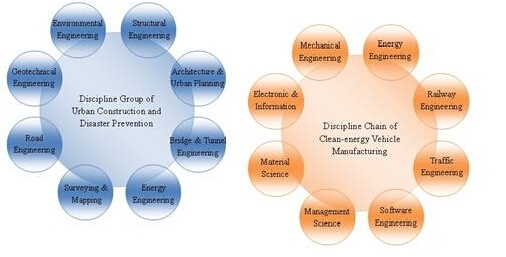Discipline Development
Key disciplines
Currently, the university has 9 major disciplines, namely, sciences, engineering, medicine, humanities, law, philosophy, economics, management, and education. Under this broad category there are three state key disciplines--architecture, civil engineering, and traffic and transportation engineering; seven state key sub-disciplines--marine geology, engineering mechanics, machine designing and its theory, material science, control theory and control engineering, geodesy, and geodetic engineering, environmental engineering; three state key sub-disciplines being developed--fundamental mathematics, condensed matter physics; and ten Shanghai municipal key disciplines --- architectural designing and its theory, history and theory of architecture, control theory and control engineering, solid mechanics, management science and engineering, traffic engineering, disaster prevention, and reduction engineering, geological engineering, internal medicine, and foreign philosophy.
The disciplines of Architecture, civil engineering, sea, environment, vehicle, and transportation are all in the leading position at home and abroad. With these advantages, Tongji University has been emphasizing core-discipline enhancement, improvement of emerging disciplines, interdisciplinary integration, and systematization of all the disciplines, thus promotes docking between subject chain and industrial chain, and optimizes the subject development pattern.
The discipline group of urban construction and disaster prevention and the discipline chain of clean-energy vehicle manufacturing constitute the world’s leading innovative research. (see Fig.1)

Fig.1 The discipline group & the discipline chain
Discipline group of urban construction and disaster prevention
Urban planning and architecture, and civil engineering have been the university’s strongest disciplines for a long time. They have taken the lead among all the universities and research institutions in China and have considerable international influences as well. With these two disciplines at the core, the development of several other principal disciplines like survey, transportation, material science, mechanics, management and environment have been boosted which thus formed the most complete and systematic discipline group of urban construction and disaster prevention. This discipline group not only developed a great number of masters and scientific elites, but also provided strong technology support for many national major construction projects such as the major projects of Shanghai Bao Steel, Yangshan deep-water harbor, long-span bridge, Bird Nest of 2008 Peking Olympic Games, 2010 Shanghai Expo, cross-river tunnel, urban rail traffic and Shanghai World Financial Center, etc.
Discipline chain of clean-energy vehicle manufacturing
The traffic engineering discipline, which is represented by clean-energy vehicle, has become the backbone for the innovation of China’s clean-energy vehicle development. At the mean time it stimulates the development of transportation engineering, rail traffic, electronics and information, mechanical engineering, material science, management and other main disciplines. As a result, the chain of clean energy vehicle manufacturing is formed, which takes the leading position in the comprehensive strength and shows the trend of rapid development in China. The hydrogen fuel cell car, which has been developed on this platform, has been successfully put into use on the Beijing Olympic Games, contributing to the realization of High-tech Olympic Games. In 2010, it also made contributions to the realization of zero emission in the expo park.
Development of other disciplines
The discipline of deep--sea geology of Tongji University has become the most important academics research center of the western pacific deep sea geology. The Tongji research group not only represented China to preside over the Ocean Drilling Program, but also established the only state key lab of deep sea geology, which plays an important part in China’s deep sea observation network. Serving as a significant platform of the country’s ocean strategy the deep sea observation network is a scientific project with important strategic meaning. The construction of the deep sea observation network will promote the congregation of the relevant disciplines, such as mechanical engineering, electronic engineering and material science and engineering.
Electronic and information engineering, medicine and life science have witnessed rapid development and have laid a solid ground for the sustainable development of all disciplines. Basing on the two features of internationalization and urban development, the disciplines of economics, management, liberal arts and law have achieved big progress, and become new power of the discipline development.
